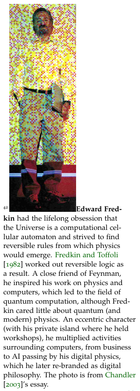(New favourite, eccentric crazy scientist: the Zaphod Beeblebrox of Science.) |
Revision as of 09:45, 24 June 2024
It was fitting that he owned an actual island. Because somehow an island was a metaphor for Ed’s life: separate, independent and unique.
Edward Fredkin
Ed Fredkin is one of the most unconventional, eclectic, off-the-beaten-track scientists. His most famous contribution is reversible logic, and people working in quantum computation know the Fredkin Gate.
The more famous Toffoli gate is from Tom Toffoli whom Fredkin hired to pursue his life obsession of reversible cellular automata. He is one of the first to have speculated that we live in a computer simulation. Toffoli had postulated the possibility of reversible computation by storing intermediate values. Fredkin had the better idea of reshuffling data, not storing anything, as the process of computation itself was reversible. Some say he was the inspiration for Falken in the movie Wargames (who also has his private island) but Stephen Wolfram checked that this isn't the case (Hawking was!) This would have been a fairly shallow inspiration anyway. The proper inspiration would have been of Douglas Adams's Zaphod Beeblebrox who «attacked everything in life with a mixture of extraordinary genius and naive incompetence and it was often difficult to tell which was which.» Fredkin also was a professional aeroplane pilot and had many planes, which was handy for the island.
He was a millionaire thanks to his [[2]] (triple I) company. This allowed him to buy the [Island] in the Virgin islands, which hosted the best restaurant of the area and where he organized many workshops and invited colleagues for retreats and "networking". He indeed had a rich network of influential and top-rate relations, especially in the AI area (Marvin Minsky, John McCarthy, etc.) but also in Physics as this was his (frustrated) obsession, in particular to relate it to computation, which gave rise to digital physics, a term that Fredkin coined although he later "upgraded" it to "digital philosophy". Most notably, he was a close friend of Richard Feynman and his influence on him—relating physics and computation—led Feynman to his famous essays and insights into what became quantum computation.
Fredkin seems to have been similarly involved in a secondary role in basically everything relating to computers, especially regarding AI. He started, for instance, the chess competition between man and machine, lost by Kasparov to Deep Blue (made famous from another institution but Fredkin also paid the more modest prize he had promised). He also had a patent on self-driving cars and was an early adopter of the Tesla model. He had the vision that the Universe reduces to a cellular automaton, and the related idea from Wolfram made the two clash on priority to the claim. What is certain is that Fredkin was more of a visionary than an expert, more a businessman than an academic, more a dreamer than a scientist. For that reason, he touched upon many things but brought very little to completion or fruition. When others did that, with or, often, without his input, he sometimes made bitter comments on his stolen credit. Wolfram documented this well.
References
- Remembering the Improbable Life of Ed Fredkin (1934–2023) and His World of Ideas and Stories, Stephen Wolfram Writings. A fantastic and captivating piece following Fredkin's death. Almost a book by itself (with an appendix to "humble" the late Fredkin on how to use calculus to prove your point).
- Three Scientists and their Gods by Robert Wright, one of the scientists is Fredkin (did not yet read this).
- In the beginning was the rule. D. L. Chandler in New Scientist 178:32 (2003).
